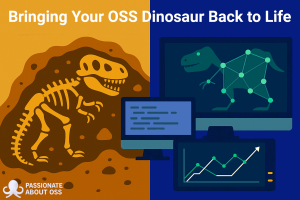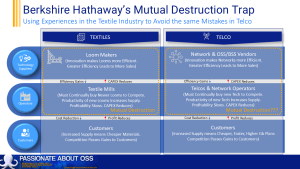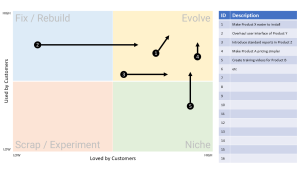
Telco is a Circus with Thousands of Balls in the Air
Are you frustrated by the complexity of your OSS/BSS factory? With hundreds or even thousands of systems, all trying to juggle thousands of activities without
“Most of us are, by default, in automation mode. We are pattern-seeking animals, and there is immense comfort in the familiar…established systems help to preserve our energy and attention. Things are easier. The cognitive (and emotional) burden of trying to figure out what needs to be done, when and by whom, is minimal, Automation is a good state to be in, when it’s working.”
Dr. Jason Fox.
Automation is a big buzzword in OSS at the moment. Come to think of it, it probably has been for years. But the automation referred to by Jason Fox has been around for far longer. It refers to the psychology of change.
It’s true, automation is a good state to be in, when it’s working. Unfortunately OSS is like a child on a red cordial bender – it rarely sits still for long enough to catch its breath. Sometimes change is enforced on an OSS (eg a new service, device, organisational restructure, changing customer usage patterns, etc) and sometimes it’s self-inflicted. Either way, anyone involved with OSS is in an almost constant state of cognitive (and emotional) burden, trying to figure out what needs to be done, when and by whom.
Funnily enough, whilst us OSS implementers tend to go from project to project in a constant state of change, we’re often in a state of relative automation, knowing our products, what needs to be done, roughly when and by whom.
This is often not the case for the consumers of our OSS solutions. Their automation mode is thrown into upheaval by our projects, something we’re often not sensitive to due to all of our own challenges.
A congnisance of this type of OSS automation may actually be more important to the success of your project than the buzzword (which in my experience rarely stand still long enough to be considered automations).

Are you frustrated by the complexity of your OSS/BSS factory? With hundreds or even thousands of systems, all trying to juggle thousands of activities without

Are you worried that your OSS/BSS stack, or parts of it, might be in desperate need of an overhaul? Many OSS experts love being archaeologists,

The story of Berkshire Hathaway is a famous one. It started in textiles but Warren Buffett chose to drastically change strategy because the textiles industry

Most OSS/BSS roadmaps today overflow with novelty and buzz. You might even hear the words Agentic AI come up (not that I have anything against